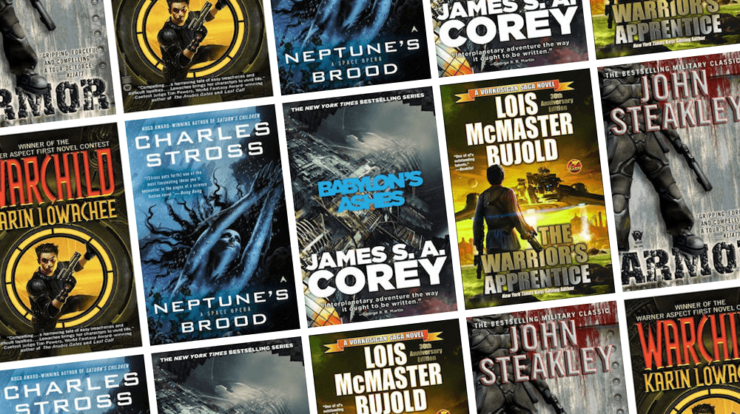Disclaimer: If you’re hoping for a hard sci-fi piracy list, know that I chose these novels for the characters and events, although several of them benefit from stellar worldbuilding too. I also want you to know that I almost started this list with I Was Kidnapped by Lesbian Pirates from Outer Space by Megan Rose Gedris, AKA Rosalarian. However, it’s impossible to find the first and last issues of the comic at a reasonable price, and I want to offer you novels to read. So instead, please check out my five favorite books about running away from one’s problems to join a space pirate crew.
Let’s begin with a classic: Jack Crow of Armor by John Steakley (1984), running away from prison and various self-inflicted misfortunes to join a crew planning a research colony heist. I met him as he was plotting to kill somebody who didn’t need to die, and I was worried about the main character at the time, so I was not happy to see him in the book, at first. His alternative courses of action are all terrible, though, and he barely tolerates the legend that humanity has constructed around him. Because he’s an unlikable fellow, it’s fun to watch him suffer through everybody treating him as “Jack Crow, ferocious pirate.” He just wants to have a drink in peace and not be hassled, just once. He’s a fairly good pirate, and an awful person. He also has identifiable qualities. All of us are awful sometimes.
Buy the Book
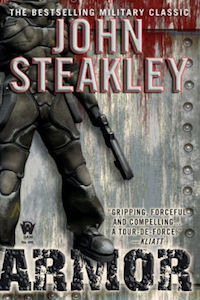

Armor
According to United States law, fan favorite hero Miles Vorkosigan gets his start at being a pirate in The Warrior’s Apprentice (Lois McMaster Bujold, 1986). Extend all of the “aircraft” terminology to “spacecraft,” here. The problem he was running from: flunking out of a military academy during wartime, because he wasn’t physically fit. In what is basically a military-based caste system, that’s a lot to escape from. What he ends up doing instead is creating his very own mercenary fleet, through wartime smuggling and other acts of necessary violence. This story may be chronologically first, but you can jump into the Vorkosigan Saga at any book. They’re all excellent.
Buy the Book
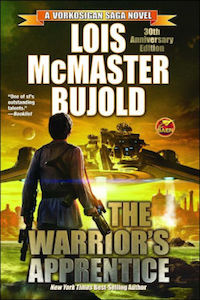

The Warrior's Apprentice
Speaking of starting a space piracy career early in life, every kid fantasizes about escaping their parents to go on an Adventure. Unfortunately for Jos Musey of Warchild by Karin Lowachee (2002), his chance to do that comes long before he’s ready for it. And after the pirates raid his family’s merchant vessel, there’s no home to go back to and the adventure doesn’t end. Jos has a hard life aboard his new home, the Gengis Khan, but eventually he accepts to become what is basically a tattooed space pirate assassin-priest. There’s no doubt that the kid is in an Inigo Montoya situation here, but he owns it eventually, and goes through a hell of a lot, and I love the story for it.
Buy the Book
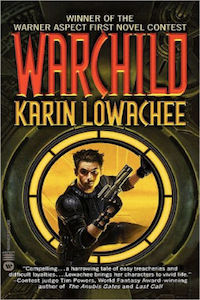

Warchild
I also love James S. A. Corey’s Expanse series. Its hero has a habit of making galaxy-wide proclamations which everybody around him wishes he wouldn’t make. This is a line in the 2016 installment of the series, Babylon’s Ashes: “James Holden has just declared piracy legal.” That’s it. That’s the series. Holden and his crew are always sailing from one disaster to the next, and this is no exception. There’s been a radical change to the galactic political landscape, and Holden has backed the losing side because he has history with them. So, what to do when you’ve got a few good friends, a solar system menaced by pirates (among other things), and less than your usual political backing? When good people can’t do good legally, they become pirates. Not like those other pirates, of course. Holden always has to be different. The many points of view in this book will be more meaningful if you’ve read the previous stories, but as a person who’s been known to start reading 20-book serieses on book 7, I say go for it.
Buy the Book
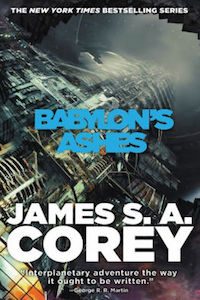

Babylon's Ashes
Finally, I first heard of Neptune’s Brood (2013) as Charles Stross’s blog post titled “Books I will not write #4: Space Pirates of KPMG.” I am so glad he wrote it anyway. Aside from the economics, which are very interesting, the protagonist, Krina Alizond-114, is venturing forth to find her missing sister when one Count Rudi and his crew attack her ship. Rudi obviously recognizes skeletons in closets because he’s running from several in his own, despite his claims to being an “honest privateer.” I mean, he is a space pirate bat accountant, and have you read about bats? Arguably he is also running from a lost love, which didn’t so much drive Rudi into space as keep him there, in my opinion. You don’t have to read Stross’s other books in the same universe to appreciate this one. Come for the futuristic economics. Stay for Count Rudi and his crew.
Buy the Book
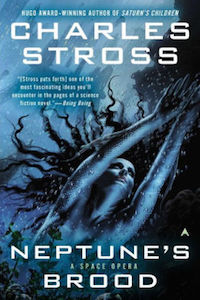

Neptune's Brood
What I like most about these novels is less the idea that one’s problems can be escaped by committing space crimes alongside one’s most dangerous friends, although that is delightful. I like the people who make that decision, consciously or unconsciously. Those characters looked around, assessed their options, and said “You know what? I could steal this ship, or maybe acquire it legally, and use it to steal, con, rob, and cause mayhem (including the literal definition thereof). That’s my best option right now.” Those are the kind of people I wrote about in Barbary Station, and those are the people whose stories I love to read.
Originally published in October 2017.
 R.E. Stearns wrote her first story on an Apple IIe computer and still kind of misses green text on a black screen. She went on to annoy all of her teachers by reading books while they lectured. Eventually she read and wrote enough to earn a master’s degree in curriculum and instruction from the University of Central Florida. She is hoping for an honorary doctorate. When not writing or working, R.E. Stearns reads, plays PC games, and references Internet memes in meatspace. She lives near Orlando, FL with her husband/computer engineer and a cat. Barbary Station and its sequel Mutiny at Vesta are available from Saga Press.
R.E. Stearns wrote her first story on an Apple IIe computer and still kind of misses green text on a black screen. She went on to annoy all of her teachers by reading books while they lectured. Eventually she read and wrote enough to earn a master’s degree in curriculum and instruction from the University of Central Florida. She is hoping for an honorary doctorate. When not writing or working, R.E. Stearns reads, plays PC games, and references Internet memes in meatspace. She lives near Orlando, FL with her husband/computer engineer and a cat. Barbary Station and its sequel Mutiny at Vesta are available from Saga Press.










